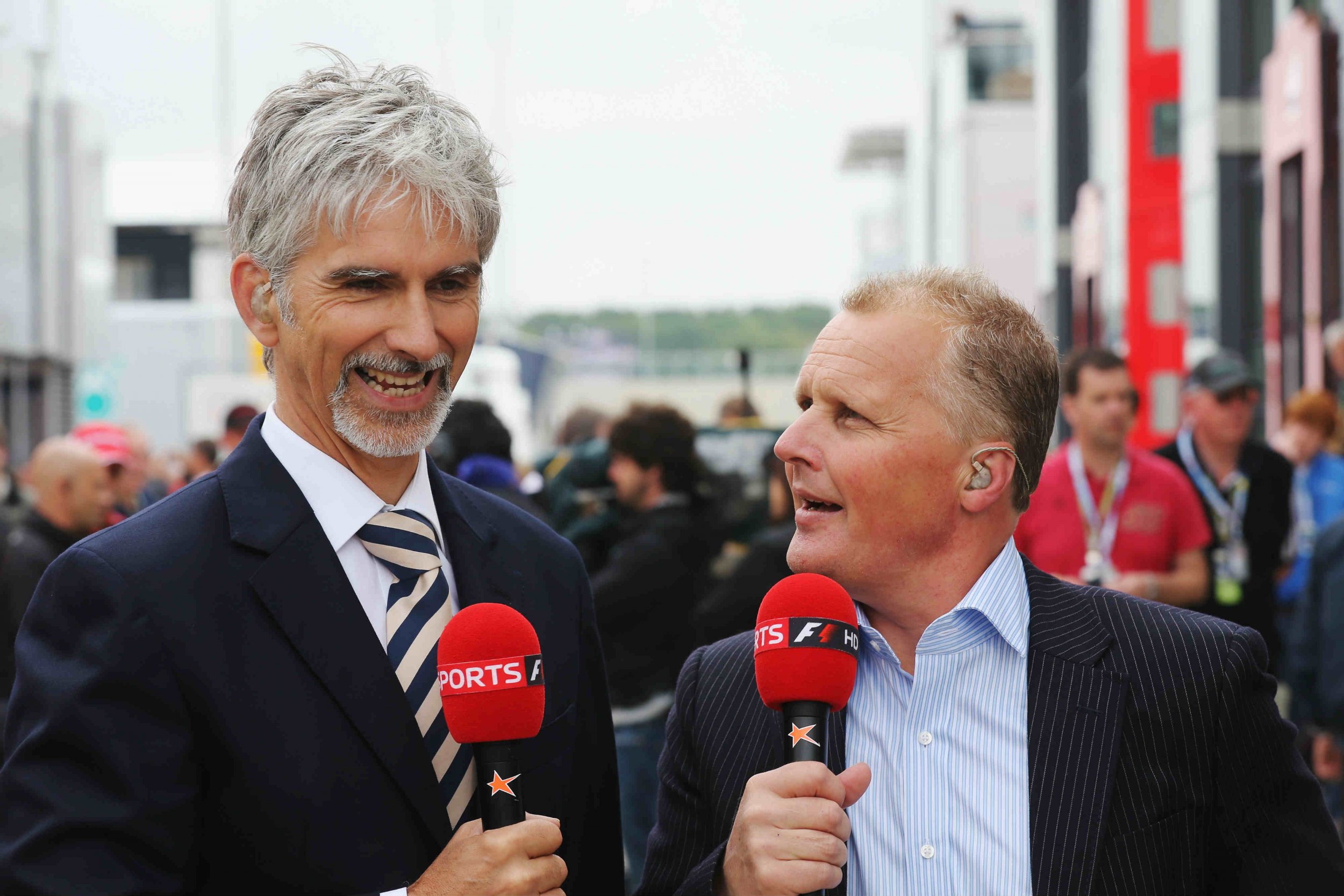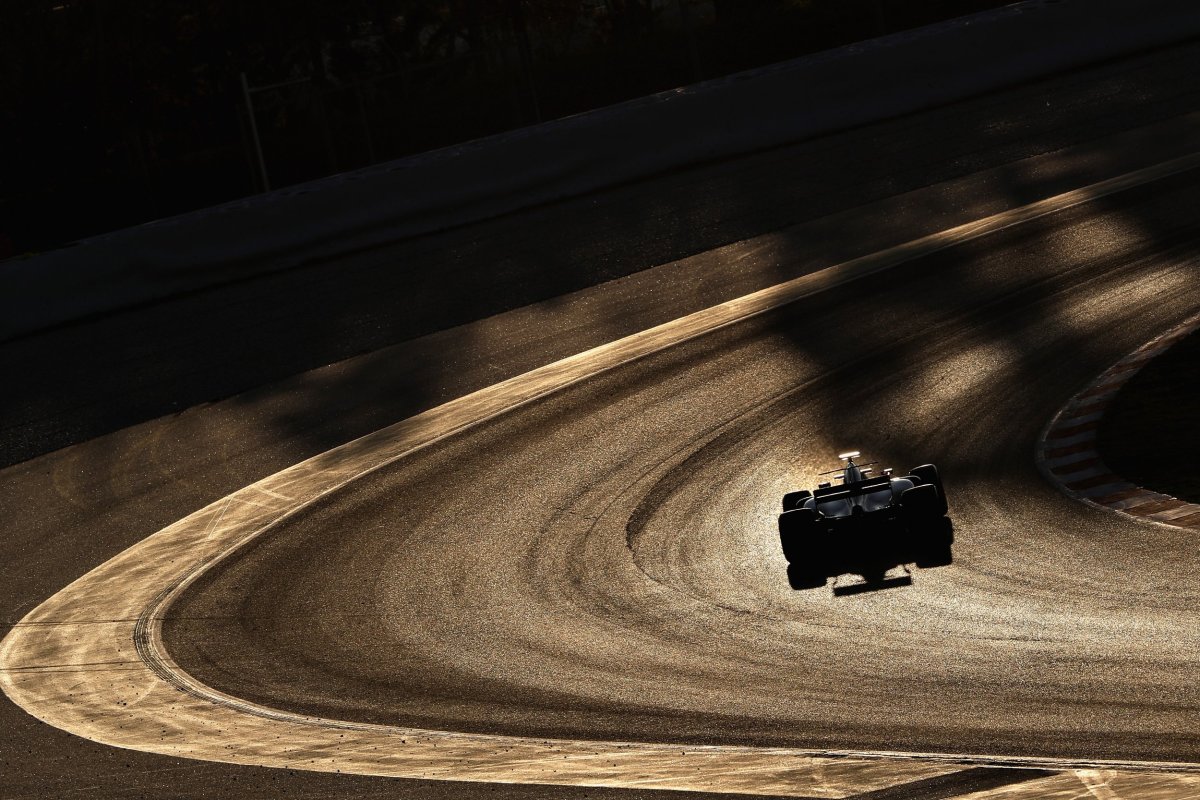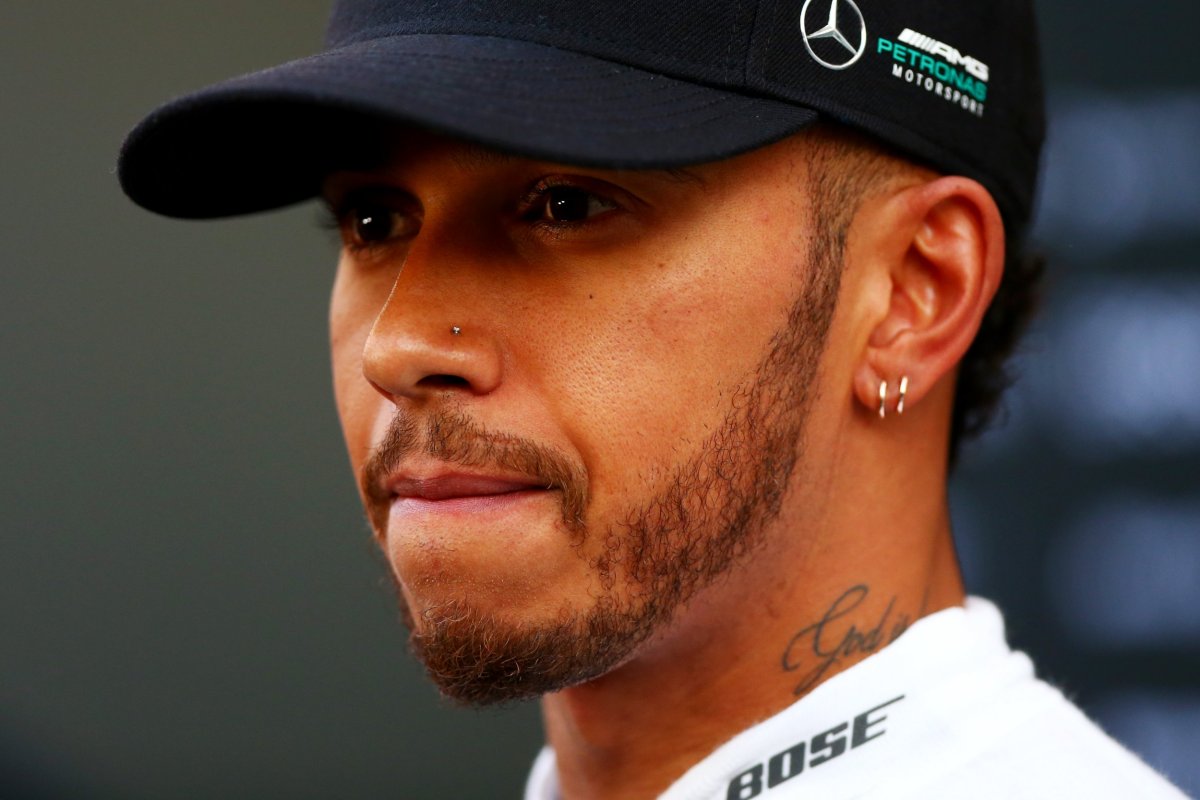
Formula One has experienced some of the most dramatic moments in recent memory in the past few months, and not one involved the waving of a chequered flag.
Last season's world champion Nico Rosberg retired five days after winning the title, Liberty Media completed its takeover of the sport, Bernie Ecclestone was ushered out as chief executive, and Ross Brawn was slipped back in as managing director. What's needed now, is some actual racing.
Over the past two weeks, teams have been in Spain testing out new cars on the Circuit de Barcelona-Catalunya before the first Grand Prix in Melbourne on March 26.
But while the engines were being revved and tweaked, Newsweek spent an afternoon in the company of former world champion Damon Hill and ex-driver Johnny Herbert to find out what viewers can expect over the next nine months of racing.
********
Shall we start with testing: Who has caught your eye in Barcelona this week?
Damon Hill: There are at least some strong signs from Ferrari that are good, which is encouraging. Certain circuits are very difficult for the drivers to gain an advantage, and Barcelona is one of them. So, they really do line up according to the peak performance of the car. It's not always a good sign of how things will pan out over the season really. Get to Melbourne and it's a slightly trickier circuit, really, more of a driver factor there; China is more like Barcelona. But once you get to some of the slippier, bumpier tracks, you tend to mix up the order, so I wouldn't say it's a foregone conclusion but Mercedes do look good again.
Johnny Herbert: The Ferrari and the Merc look secure. Sebastian [Vettel] looks comfortable and in this downforce era, it will suit him for sure.
The noises coming out of Ferrari aren't giving too much away. Are they quietly confident?
DH: They've tried to play it down because they learnt that lesson last year, and they don't want to be overconfident because they will get slagged off terribly when it doesn't happen. They're wisely not making great claims. Is this car the product of [former Ferrari and now-Mercedes designer] James Allison's work, or what? If it is, then they rather have done the wrong thing in letting him go. But the car looks good.
JH: You hear a bit of noise where Merc are a concerned, but you always know Merc aren't going to be turned right up. You know it's going to happen about four or five for them and then they'll turn it up at the end. They're okay, it's about Ferrari and Red Bull and seeing if they can attack them. Damon's right, Barcelona is one of those tracks but it does give you a bit of a sign, and the sign is they've done a good job over the winter.

How important do you think this year is for Ferrari team principal Maurizio Arrivabene? Could it be the end for him this year if they don't get it together?
JH: It would be the classic Ferrari way of give him a bit of a chance, and if that chance doesn't work then change it all over again. I like his passion, it's great. He's got that typical Italian hot-headedness that is perfect for the sport. If they are able to turn it around, it would be good for him and for F1 but, more importantly, it would be good for those two drivers. I like Sebastian. Kimi [Räikkönen] did a remarkable season last year and it doesn't look like he's lost any of his passion for it. If you get those two on form, and Ferrari on form, Lewis [Hamilton] has always wanted that challenge.
So he says, anyway…
JH: No, he does. He wants to prove he's the best. And that's what he enjoys: that racing that we haven't seen for a while because it's been dominated by two drivers. We've seen a bit of racing from both of them but you want to see it by another car, from another source, either of the two Red Bulls; it would be lovely to see Daniel [Ricciardo] or Max [Verstappen] battling it out with them. It would be good for us, because we don't want it to just be one team and one driver.
Read more: Bernie Ecclestone's Formula One Legacy May Not Survive, Warns Max Mosley
It's been a while since we've seen someone with genuine pace take pole over Mercedes. Do you think we need that more than ever this season?
DH: You give people a design challenge, they go away and work on it for six months, and they produce what they've designed. When it comes out, one of them can be considerably better than the others, and then the other has to catch up for the rest of the season. It's impossible. There has to be a way for Formula One [to close the gap]. You don't want to prevent innovation because that's part of the attraction for this sport. The thing people like is the cleverness of design, but there needs to be a way, once they've demonstrated their dominance, of letting other people catch up so it doesn't destroy the racing.
It's great if you've got two teammates who are fighting it out. So you can have McLaren winning 15 or 16 races, with [Alain] Prost and [Ayrton] Senna, and we don't care because it's like watching [Rafael] Nadal and [Roger] Federer. Two rivals are as good in any sport for providing entertainment, but if you've got one driver who dominates, which is what we had in the Michael Schumacher era, it will damage the sport, so we need to avoid that situation. How do we achieve that? This is one of the perennial problems Formula One has, and no one has yet come up with a workable solution.
What about talk in recent years of resource restriction? Could that work?
DH: No one has properly tried it, and we do have a sort of resource restriction thing now because we have a limited number of engines and so forth.
JH: It's only the ones with the big budgets who can develop faster than the Force Indias and Williams — you want them to be involved. My thing is still distribution, and then big teams have to work a bit harder. Will they still have the extra resources because it's Mercedes Benz? Probably. Will they still win? Maybe. But at least there is a chance for the underdog to get into play. It's a bit of a balance.
Say Liberty, the new owners, phoned you today and said, 'What problem do you want to focus on?' What would you say?
JH: You've got to get the fan closer to the action that's going on in the garages. Most fans see drivers from afar; they don't have any contact at all. I know it's difficult, I know [Damon] has bigger problems than I ever will because of what he's achieved…
DH: Johnny would have everyone round his house if he could. The thing is, at the extreme end you've got Lewis who wants to give as much as he can, but at the same time you can't let everybody in because one person can't cope with that amount of interest in their life. So you're bound to have a barrier and getting fans close. What does that mean? I think we need to never lose sight of the fact people turn up to see motorists because they want to see something exciting happen. Either they turn up because they want to smell the cars, hear the cars, see the cars on their own — which is impressive enough — but they also want a good race.
It's very upsetting if you turn up to a race meeting and just watch cars follow each other for 70 laps. That can be soul-destroying for everyone. Ross Brawn is right in one of the things he's been saying: You've got to have a long term plan, you've got to say, 'In five years time from now, what is the goal? What are we after?' And the danger being you make an artificial sport out of it and you pursue too much the entertainment side at the expense of the challenge of the sport, for teams and drivers to compete.
JH: I don't see that challenge for the drivers and teams to compete changing. If you bring the entertainment in, it doesn't change. It's frustrating because they can't dominate and dictate how the rules are done in the future. That's where I hope Ross doesn't allow the teams to dictate where they go. Somehow it's trying to equalize it and keep it similar.
How much has it all changed since you guys were driving?
DH: We were so lucky because when we were racing they used to throw away money. A lot of it was tobacco sponsorship, and other sponsors, and the teams were owned by individuals who wanted to win. And they would throw money away at things but there was only 150 people so they were able to make decisions. Now, you've got 800 people or more and you're dealing with the reputation of major motor manufacturers, like Renault and Mercedes. That's an issue for our sport because drivers can't be the charismatic people the fans want them to be because they've got this huge responsibility to the workforce and to the reputation of the brand.
JH: And that's where it goes wrong, because the brand is bigger than anything else. And everybody I meet who goes to Silverstone to sit on the bank, to sit in the Grand Stand and watch, yeah they might have a Mercedes, Ferrari, Red Bull cap on but they always say they're there to see Lewis or Kimi or [Nico] Hülkenberg. They're there for the drivers but everything is geared for the team.
DH: It used to be more like drag racing where there would be engines they would use once for qualifying, and then they would kind of melt after a lap. That was the entertainment because they turned up the boost and wouldn't know how to measure it. So these engines would be blowing up and that was the profligacy of the sport. They could take the decision to waste a lot of money on entertainment. It's like fireworks: You can have a firework display and someone comes along and says, 'We don't want to waste too much money on this and we don't want to make a lot of litter.' And you want to go, 'No, fuck that, we want £10 million to go up in smoke.' And that's what you're talking about with Formula One. We're talking about a billion dollars of fireworks, you should be able to have a pretty good display.
What do you think of Ross Brawn's idea of having a non-championship race?
JH: It will all go down to money again for the teams who turn up and decide what cars to use. That is the problem with it now compared to when we used to have Cosworth and everything else. It was a lot easier to do.
DH: And with what cars? Would they use the same cars? I'm not sure.

As racing drivers, what do you make of the idea of driverless racing cars?
DH: Sometimes, we were accused of having a driverless car.
JH: I can't get my head around how you would do it. I can't see an entertainment side to it unless there's crashing and cars going all over the place.
DH: We're at the point now where we have the capacity to automate everything, and so we now have to look at what the sport is wanting to attain. And isn't it, I would argue, the driver-control factor and teams working without the ability to predict everything, which we have at the moment? You almost know the result of the race before it can even start, and that's not really what we want to know; we want to know how we, as human beings, can cope with difficult situations — and that's the entertainment value.
JH: Lewis, to me, is the best — like Nico said, he is the bar — but if they're telling him how to drive on the track, then he's able to chip away just purely from an engine. It's not showing how good he really is. That's the art part, and we're losing the art.
Lewis Hamilton spoke this week about the possibility of overtaking reducing because of new rules making it more difficult. Is that a real concern?
DH: Yeah! I think someone made the point, which is correct: As long as you've got cars racing for position closely on the track then overtaking itself is not necessarily a measure of how good a race is. Lots of overtaking doesn't necessarily mean it's good, we have lots of overtaking with DRS [Drag Reduction System] and it's all artificial, so it's the closeness of cars on the track that's the key thing. In my view, that's the thing we should be aiming to achieve.
JH: You should also allow the skill of the drivers to show. With new rules being brought in, we have actually started to lose the possibility of overtaking. We've got rules for how you overtake, and, I mean, that's a skill, it's not a rule. And there are certain ways of doing it. But to actually say when under braking you can't move because it's dangerous, personally I don't get that. That's what a driver, who is in the front trying to defend, makes it difficult for the guy who goes for it, but it's also the skill of the guy behind to get the other guy in a position to go past.
DH: I blocked Senna once, and he told me off [Hill pumps his fist in celebration as he gets up to leave]. And nowadays, I would have probably have got a grid penalty and a £20,000 fine.
*****
Sky Sports F1® will show all 20 races this season, live in UHD for the first time with Sky Q, starting at the Australian GP on 26 March.
Uncommon Knowledge
Newsweek is committed to challenging conventional wisdom and finding connections in the search for common ground.
Newsweek is committed to challenging conventional wisdom and finding connections in the search for common ground.
About the writer
To read how Newsweek uses AI as a newsroom tool, Click here.








